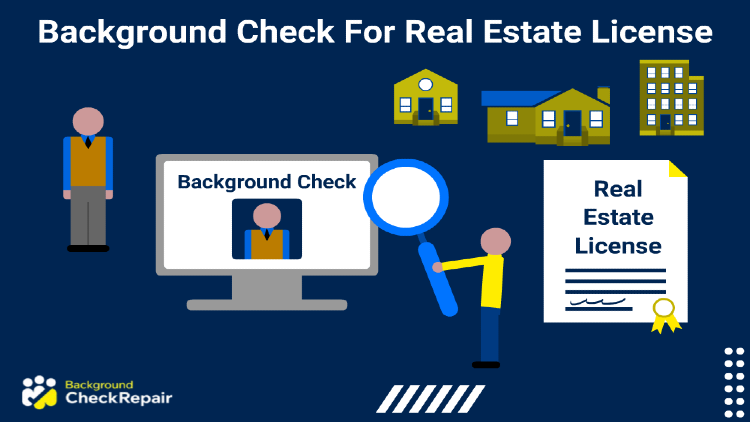
The requirements included in a background check for a real estate license help ensure that agents are trustworthy and will be able to carry out their jobs according to the law.
Each state has its own specific requirements for real estate background checks, but 8 of these are nearly universal. Each state has a detailed application process for becoming a real estate agent or broker, and knowing those steps, as well as the requirement involved, can make the process smooth.
Before undergoing a background check, potential agents can do a background check on themselves to ensure that all the information returned on the reports is correct, and there aren’t any disqualifying offenses that might cause a hitch in the state application process.
This guide provides information about the process for a background check for a real estate license in every state, including the time span covered by background checks, the things that might cause someone to fail a background check, as well as the requirements that all agents must meet. And, it outlines how to perform the checks yourself.
What Is a Real Estate License Background Check? (What Kind of Background Check for Real Estate?)
A real estate license background check is a form of professional license verification that examines a number of factors to determine if a person qualifies to become a real estate agent in a particular state. The licensure check applies to both those applying for a real estate sales role or a broker’s license, and those who wish to upgrade their current status, such as moving from a real estate salesperson to an agency broker.1
Some things that are commonly examined include:
Every state has a background check requirement to become a real estate agent, but may do so through different agencies. For example, California qualifies agents through the Department of Real Estate, whereas other states may use a Department of Commerce.2
But, each state has its own department dedicated to real estate licensing. The table below includes all 50 states, with links that outline the steps involved in becoming a real estate agent or broker for a non-profit.
Requirement #1. Fingerprint Clearance
Most real estate license background checks require a fingerprint scan through a state-approved facility (or a fingerprint card submittal). After an applicant finishes the fingerprint scan, they must submit their legally-obtained fingerprints to the federal Department of Justice (this is usually done by the state).
The Department of Justice will then run their background information to scan for arrests, convictions, or charges. The fingerprint capture and collection are typically conducted using a ‘live scan’. This is the electronic fingerprint collection by a state-accredited agency necessary for any person applying for their real estate license.
This process typically takes around 72 hours for the Department of Justice to complete and send to the respective state’s law enforcement agency.
Many states (like Arizona) issue fingerprint clearance cards after the checks are completed, to be included in the application packet.
Requirement #2: Criminal Background Check
A criminal background check that includes county-wide searches, state, federal, or different jurisdictions is conducted as part of the background check for a real estate license.
A real estate agent background check will uncover any crimes committed by the person in question. Depending on the specific type of offense, such as a misdemeanor or felony, this could prevent the individual from being able to practice real estate in a specific state.
If a person has a felony, they MAY be disqualified from becoming an agent — but the official decision depends on the nature of the felony, how long ago it occurred, and how it relates to working in the real estate industry.
How To DIY:
To run a background check on yourself, use the fingerprints obtained to submit personal background checks in the state where the license is sought (usually at the state police website), as well as using the Identity History Summary Check platform operated by the Criminal Justice Information Service (CJIS).
Requirement #3: Real Estate License Test
In addition to the background check that is conducted, every state has its own real estate license test, which must be completed and submitted with the license application.
In addition, there is a separate test for individuals seeking brokerage licenses.
Typically, the state will require that the applicant submit the original score or original scored test with the application.
Requirement #4: Sex Offender Registry Check
As part of the criminal history search, sex offender registries in the specific state and the nationwide database are searched.
These criminal background checks are available for anyone to perform at no cost.
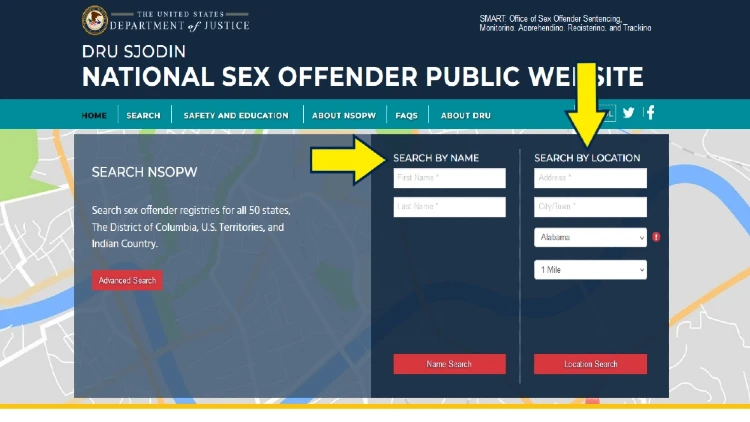
How To DIY:
Checking these lists for inaccuracies is a good idea. To check the state list:
Step 1: Google the state (for example, Alabama) with the words “sex offender registry”
Step 2: Follow the link provided to search by name using the state platform.
To check the national sex offender registry, simply search the name on the website.
Requirement #5: Identity, Work Eligibility, and Address History Check
A background check for a real estate license will often include residency, work eligibility, and identity verification checks.
Some states have a separate work eligibility form to complete and include in the application packet, while others utilize E-verify and similar social security background check processes.
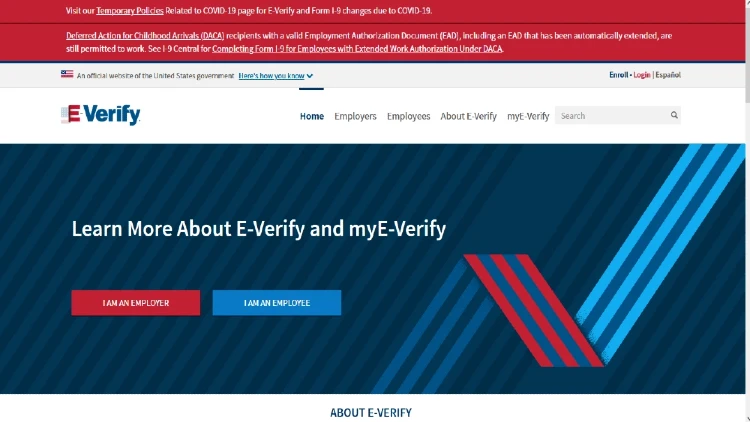
A disciplinary disclosure form is common for most real estate background checks and license applications. The forms usually ask (under penalty of perjury) about previous work history, whether the individual has ever had a license revoked, and potential drug charges.
For example, Arizona’s disciplinary disclosure form asks about these items, as well as court judgments and DUIs.
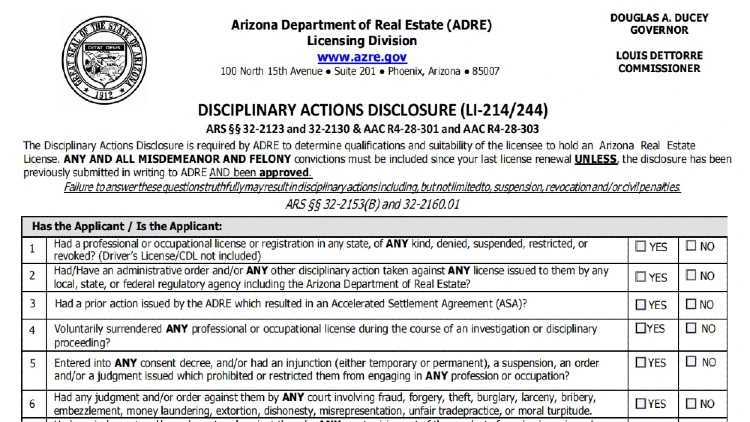
Making false statements on these forms will cause applicants to fail the background check, and may open them up to legal punishment.
If an applicant answers yes on a disciplinary disclosure form question, there is typically an additional document that can be filed with the form, explaining the situation and the penalties or punishments that were carried out.
This disclosure document outlines the options that applicants have of showing that they are suitable to get a new real estate license issued, usually by providing court documents that outline rehabilitation or rectification that was taken.
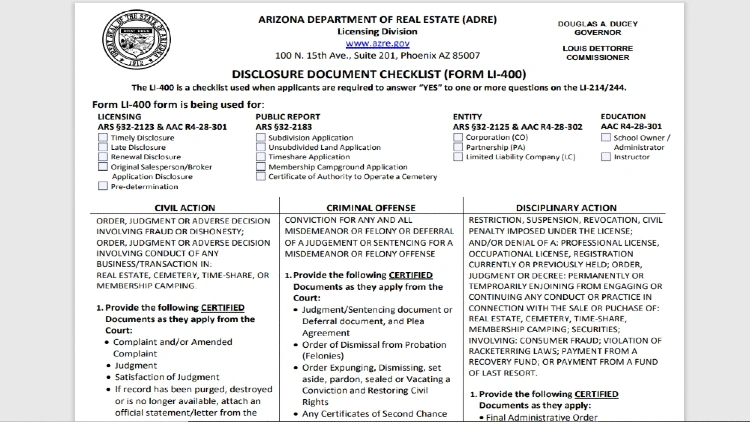
Requirement #7: Field Experience Documentation
The background check for a real estate license will be able to confirm the experience outlined in other forms used for the license application.
For example, most states require a specific number of hours spent in courses that teach how to sell and write contracts, (such as a 90-hour Salesperson pre-licensing Course Certificate and a 6-hour Contract Writing Course Certificate).
When the background check is performed, those hours can be confirmed by work history.
Requirement #8: Driving History Checks
Although not all applications require an MVR report, most of the background checks for real estate licensing check these.
How To DIY:
To get a copy of an MVR report:
Step 1. Google “Motor Vehicles Department [Your State]
Step 2. Search the government-issued website for features like “get a copy of my driving record.”
Step 3. Pay the required copy fee or download the report.
Real Estate Agent Background Check Requirements: All 50 States
Although every state now has a mandatory background check for a real estate license, each state has different requirements.
The requirements listed above are common, but it’s a good idea to examine the specific licensing commission for the state where the license will be issued.
What Kind of Criminal Background Check for Real Estate License Is Required?
Typically, a level two background check is required, and the court records it searches are both at the state level and national.
Is it possible to get a real estate license if a person has a felony or misdemeanor that will appear on the real estate background check? It depends on the state in question. Certain states won’t consider a person’s application if the mandatory wait period has not passed since the charges have been filed or the conviction.
For instance, the wait time for a felony crime in Delaware is two years from the conviction date, whereas the wait time in Massachusetts is ten years from the conviction date. If the person then meets the rest of the necessary criteria to become a real estate agent, they can move forward with their application through the typical process.
Applicants must keep in mind that they must have a clear civil and criminal history for the last seven years before they can apply. Even if their criminal history is clear, if they have any civil infractions, it can be impossible to obtain a real estate agent membership.3
How Far Back Does a Real Estate Background Check Go?
A real estate background check will go back seven years, but the specific amount of time depends on the state and local laws regarding the type of check being utilized by the employer.4
In order to apply for a real estate agent license, research the state’s application forms, fingerprinting requirements, and background check information.
The following table provides links to real estate forms and fingerprint card requests.
What Disqualifies You From Being a Real Estate Agent? (Failing Background Check Real Estate License)
There are certain black marks on a person’s record that can immediately disqualify them from being a real estate agent or obtaining a license.
Typically, the disclosure form identifies any instances that can cause an application to be denied. This means that if a person was arrested or convicted of a crime that is not relevant to real estate duties, this might not disqualify a person. However, if the convictions are directly related to the functions or duties of a real estate agent, it will disqualify them.
Furthermore, the appearance of sexual misconduct can be an immediate disqualifier.5 In addition, other crimes that are likely to disqualify a person from obtaining their license include forgery, perjury, fraud, misrepresentation, felonies involving controlled substances, driving under the influence, or offenses against property.6
How Long Does a Real Estate Background Check Take?
For most states, the average processing time for a real estate background check is between 3 and 6 weeks.
Understanding what can appear on the background check for a real estate license and the requirements involved simply requires doing a state search using the links provided above.
Frequently Asked Questions About Background Check for Real Estate License






